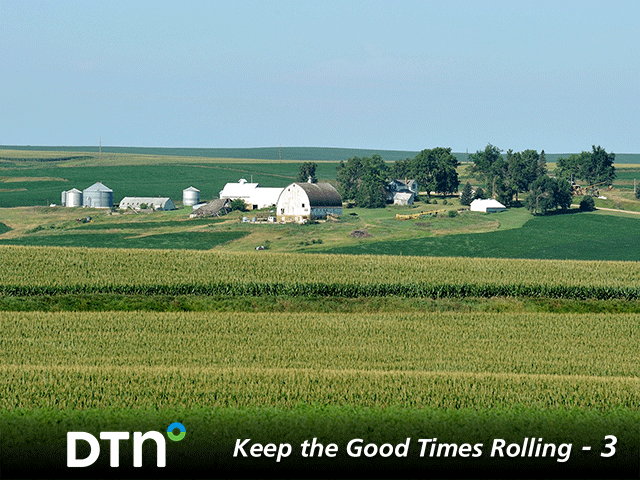Keep the Good Times Rolling - 3
Contact Landowner Now to Smooth Way for Rent Negotiations
INDIANOLA, Iowa (DTN) -- The average cash rent in Iowa jumped $40 per acre from 2011 to 2012, then to $235 as the market adjusted to massive new demand for corn from the burgeoning ethanol industry. Rental rates peaked at $260 two years later, but have hovered between $230 and $235 per acre, according to the National Agricultural Statistic Service.
"Some rent increase for 2022 is likely, but the lesson learned after the 2012 price explosion was that coming down was very hard to do once the grain price rally was over," said northeast Iowa farmer Ben Riensche, owner of Blue Diamond Farming Company in Jesup, Iowa.
After years of modest to nonexistent profit margins, revenues from the 2021 growing season are on track to be the highest in eight years, and experts say landowners are going to want to partake in the upswing in prices.
In this special DTN series, we explore a variety of ways farmers can "Keep the Good Times Rolling" by making smart investments and business decisions that will pay off when the price cycle heads lower. This story, the third in the series, explores tactics farmers can use to manage land expenses -- usually one of the largest items in their budget -- especially since experts say this price cycle is likely to be more transitory than the ethanol boom.
BUILD TRUST WITH COMMUNICATION, REPUTATION
Many farmers dread the tug-of-war that is cash rent negotiations with their landowners in the fall, but experts say there are ways to make those conversations go smoother.
"The best advice I can offer is communicate with your landowner(s) throughout the growing season. When communication is strong, there is less conflict when it comes time to renew the lease," said Nate Franzen, president of the Ag Banking Division at First Dakota National Bank in Yankton, South Dakota. "Reach out and start the communication."
It pays to be proactive by keeping your landowners informed when times are good and when times are bad, said Jeff Troendle, president of Hertz Farm Management, Nevada, Iowa. He suggested paying attention to their communication preferences, which can vary based on the landowner's age.
For instance, you might print and mail to your older landowners a letter every quarter highlighting what's happening on your farm and in your family. Or, you email every so often the progress of your crop to the 40- to 50-year-olds who inherited the land they rent to you. For the youngest of the lot who have an interest in your farm, you send a "got the crop planted" text or text a photo of your field after a 3-inch rain, Troendle said.
You can also ingratiate yourself by delivering sweet corn to your landowners, plowing their snow or visiting with them throughout the year. It also helps to get involved in your local church or civic organizations.
Another key factor for some landowners is how you are treating their ground. Are you nurturing their farm? Don't forget to tell your landowners how you are caring for their land.
But, still, at the end of the day, most landowners care about the money, Troendle said.
KNOW WHAT'S FAIR
Troendle said it's important to remember that everyone just wants to be treated fairly.
P[L1] D[0x0] M[300x250] OOP[F] ADUNIT[] T[]
"Last time we saw a similar spike in commodity prices, it caught a lot of people off guard, as it did this year," Troendle told DTN. In 2013 and 2014, some farmers let their owners be OK with lower rents. That strategy worked for some but backfired for others.
"It's important to remember that on straight cash rent leases, we are always a year behind. Rents for next year are based on what we saw this year," he told DTN. "It is when folks get overly optimistic or pessimistic about the future and try to set rents based on their opinion of the future that things break down."
Historically, land rent is generally 25% to 30% of gross profit. The lower end of that scale compensates the tenant for absorbing all the production and price risk, as in the case of cash rent.
Because cash rents are generally set a year before gross profit on the land is determined, the owner can feel cheated in the good years and the tenant can struggle in bad years, especially on multiple-year cash leases.
FLEX LEASES OFFER A FAIR OPTION
Riensche said he's working hard to move to some sort of flex lease structure with his landowners, even though they can be more administratively burdensome. For the most part, they reward the landowner in good years and help spread the risk in the down years.
However, this option can even add risk if you don't match your marketing pattern to the price calculation in the lease. For example, if you market grain two to three times a year, using a 12-month average price could actually increase your risk.
Riensche's favorite flex lease uses the average of the spring and fall crop insurance price multiplied by the APH (actual production history) yield multiplied by 33%, or so. "The crop insurance price is calculated by a third party, is published and easy to access and respects the crop revenue insurance calculations as a risk management tool," Riensche explained.
"The 33% can be adjusted based on crop mix (corn versus soybeans) and market forces. If you have lots of beans, then push toward 40%. If you have lots of corn in a bad basis area, push toward 30%," he said.
John Halcomb, who raises corn, wheat, soybeans, barley and rye in Adairville, Kentucky, would like to offer his landowners a more adjustable rate cash rent. "But, oftentimes, they prefer the simplicity of straight cash rent."
For more information on flexible cash rent options, also known as variable cash rent leases, please see this Fact Sheet by the University of Illinois Farmdoc team: https://farmdoc.illinois.edu/….
CONSIDER PAYING A BONUS
Halcomb, who farms north of Nashville, Tennessee, with his brother, said that if you have a solid relationship with your landowners, they will understand when you have a good or bad year. "And when you have a good year, make sure the landowner sees the benefit of that," he advised.
Most of Halcomb's land leases are on two- to four-year terms. "I prefer not having to negotiate every year, especially if we make long-term investments on a particular farm," Halcomb said.
Franzen, the South Dakota banker, said he works with a number of proactive farmers that'll offer a bonus in profitable years without the landowner asking for one.
How much of a bonus should you offer? Franzen suggested letting the particular farm dictate that. "It's human nature to gravitate to high numbers, and we think that the highest price talked about in the coffee shop is 'the market.' But that's not necessarily so."
Transparency is key, he said.
"Be honest about the productivity of the ground you rent from your landowner, Franzen said. "Explain, 'Of all the ground I farm, the best ground has a proven yield of X. The average proven yield of all the land I farm is Y, and your farm's proven yield is Z.' You might also want to share a price chart to show how often commodity prices are at these levels and how long they stay there."
Riensche also pointed out that both tenants and landlords must respect the cost of raising a crop is going to be significantly different in 2022 than 2021. "Farm equipment is up 35%, chemicals have climbed 20%, fertilizer has doubled and fuel has increased 25%," Riensche said. "Landlords are going to be the last to stick their hand out."
While most expect cash rents for 2022 will be higher, an ethanol-boom-sized bump seems unlikely.
"It's my sense that it is a little premature to bump cash rent levels too much this year," said Franzen. "We need to see how long this commodity price cycle will last."
**
Editor's Note:
This is the third of a six-part special series. Next in the series: We will explore how to build a strong marketing plan and plan financially, as well as strategies for making sure new equipment purchases will benefit your business in the long run.
You can read more about price outlook in the first article of this series, "Farm Revenue Driven by Chinese Demand, Drought Concerns" here: https://www.dtnpf.com/….
The series also examined what farmers are doing agronomically to boost their production. See our second story, "Farmers Willing to Spend Money on Crops if Yield Potential, ROI Are Promising" here: https://www.dtnpf.com/….
To see a Reporter's Notebook video about the series, check out https://www.dtnpf.com/….
(c) Copyright 2021 DTN, LLC. All rights reserved.



